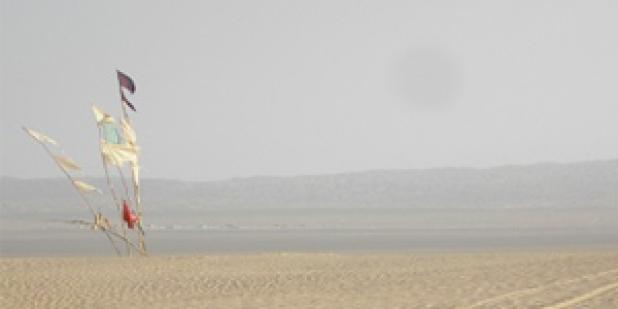Happy Lunar New Year from the USC US-China Institute!
Rethinking History in Chinese Central Asia
Lecture by Rian Thum, Dept. of History, Loyola University, New Orleans on Uyghur history.
When:
April 2, 2015 4:00pm to 5:30pm
Where

For 250 years, the Turkic Muslims of Altishahr—the vast desert region to the northwest of Tibet—have led an uneasy existence under China-based rule. Today they call themselves Uyghurs, and they have cultivated a sense of history and identity that challenges Beijing’s official national narrative. Rian Thum argues that the roots of this history run deeper than recent conflicts, to a time when manuscripts and pilgrimage dominated understandings of the past. His talk uncovers the systems Uyghurs used to maintain a sense of their homeland as a center – in the face of both the knowledge that Islam arrived from a very distant place and the fact that Altishahr was ruled from Beijing by people who were very foreign. Through the interaction of manuscript technology, sacred places, travel, and graffiti, Uyghurs cultivated a sense of the local in the face of an almost cosmopolitan connection to the rest of the world. The traces of this complex of historical practices have long been obscured by a scholarly focus on modern nationalism, but have survived to shape the political and cultural terrain of Altishahr today.
Rian Thum began his academic career in archaeology, working on projects in Syria, Romania, and China. After a short stint as an archaeologist for the US Forest Service, Thum undertook his PhD work in Harvard’s Inner Asian and Altaic Studies program, focusing on the history of the Uyghur people of what is now the People’s Republic of China. In his book, The Sacred Routes of Uyghur History (Harvard University Press, 2014), Thum argues that the Uyghurs - and their place in China today - can only be understood in the light of longstanding traditions of local pilgrimage and manuscript culture. The study uses manuscripts in Chaghatay and Persian, contemporary Uyghur novels, graffiti, and ethnographic fieldwork to uncover a complex of historical practices that offer new perspectives on what history is and how it works. Thum's research interests include historical anthropology, mobility, orality and writing, historiography, the history of money, and the place of non-Han peoples in China.? Dr. Thum also tweets news from English, Uyghur, and Chinese sources as @rianthum.
Cost:
Free and Open to the Public
Event Website URL:
Featured Articles
January 4, 2024
We note the passing of many prominent individuals who played some role in U.S.-China affairs, whether in politics, economics or in helping people in one place understand the other.
Events
Thursday, March 21, 2024 - 4:00pm PST
Ying Zhu looks at new developments for Chinese and global streaming services.
Tuesday, March 19, 2024 - 4:00pm
David Zweig examines China's talent recruitment efforts, particularly towards those scientists and engineers who left China for further study. U.S. universities, labs and companies have long brought in talent from China. Are such people still welcome?






